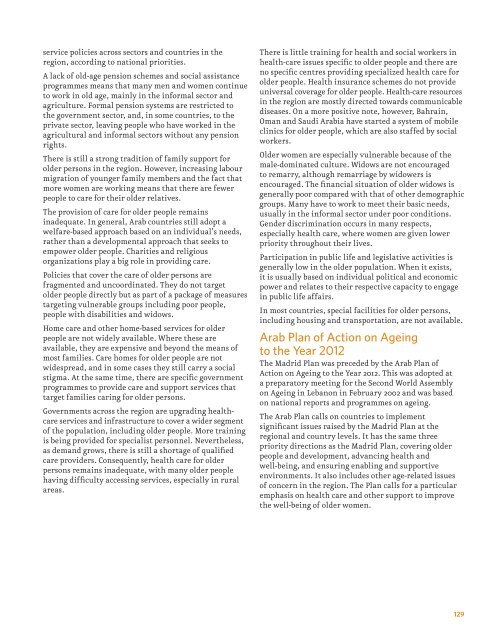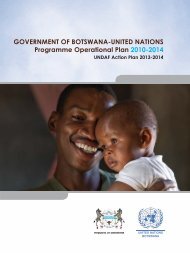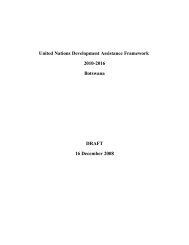Ageing in the Twenty-First Century: - HelpAge International
Ageing in the Twenty-First Century: - HelpAge International
Ageing in the Twenty-First Century: - HelpAge International
You also want an ePaper? Increase the reach of your titles
YUMPU automatically turns print PDFs into web optimized ePapers that Google loves.
service policies across sectors and countries <strong>in</strong> <strong>the</strong><br />
region, accord<strong>in</strong>g to national priorities.<br />
A lack of old-age pension schemes and social assistance<br />
programmes means that many men and women cont<strong>in</strong>ue<br />
to work <strong>in</strong> old age, ma<strong>in</strong>ly <strong>in</strong> <strong>the</strong> <strong>in</strong>formal sector and<br />
agriculture. Formal pension systems are restricted to<br />
<strong>the</strong> government sector, and, <strong>in</strong> some countries, to <strong>the</strong><br />
private sector, leav<strong>in</strong>g people who have worked <strong>in</strong> <strong>the</strong><br />
agricultural and <strong>in</strong>formal sectors without any pension<br />
rights.<br />
There is still a strong tradition of family support for<br />
older persons <strong>in</strong> <strong>the</strong> region. However, <strong>in</strong>creas<strong>in</strong>g labour<br />
migration of younger family members and <strong>the</strong> fact that<br />
more women are work<strong>in</strong>g means that <strong>the</strong>re are fewer<br />
people to care for <strong>the</strong>ir older relatives.<br />
The provision of care for older people rema<strong>in</strong>s<br />
<strong>in</strong>adequate. In general, Arab countries still adopt a<br />
welfare-based approach based on an <strong>in</strong>dividual’s needs,<br />
ra<strong>the</strong>r than a developmental approach that seeks to<br />
empower older people. Charities and religious<br />
organizations play a big role <strong>in</strong> provid<strong>in</strong>g care.<br />
Policies that cover <strong>the</strong> care of older persons are<br />
fragmented and uncoord<strong>in</strong>ated. They do not target<br />
older people directly but as part of a package of measures<br />
target<strong>in</strong>g vulnerable groups <strong>in</strong>clud<strong>in</strong>g poor people,<br />
people with disabilities and widows.<br />
Home care and o<strong>the</strong>r home-based services for older<br />
people are not widely available. Where <strong>the</strong>se are<br />
available, <strong>the</strong>y are expensive and beyond <strong>the</strong> means of<br />
most families. Care homes for older people are not<br />
widespread, and <strong>in</strong> some cases <strong>the</strong>y still carry a social<br />
stigma. At <strong>the</strong> same time, <strong>the</strong>re are specific government<br />
programmes to provide care and support services that<br />
target families car<strong>in</strong>g for older persons.<br />
Governments across <strong>the</strong> region are upgrad<strong>in</strong>g healthcare<br />
services and <strong>in</strong>frastructure to cover a wider segment<br />
of <strong>the</strong> population, <strong>in</strong>clud<strong>in</strong>g older people. More tra<strong>in</strong><strong>in</strong>g<br />
is be<strong>in</strong>g provided for specialist personnel. Never<strong>the</strong>less,<br />
as demand grows, <strong>the</strong>re is still a shortage of qualified<br />
care providers. Consequently, health care for older<br />
persons rema<strong>in</strong>s <strong>in</strong>adequate, with many older people<br />
hav<strong>in</strong>g difficulty access<strong>in</strong>g services, especially <strong>in</strong> rural<br />
areas.<br />
There is little tra<strong>in</strong><strong>in</strong>g for health and social workers <strong>in</strong><br />
health-care issues specific to older people and <strong>the</strong>re are<br />
no specific centres provid<strong>in</strong>g specialized health care for<br />
older people. Health <strong>in</strong>surance schemes do not provide<br />
universal coverage for older people. Health-care resources<br />
<strong>in</strong> <strong>the</strong> region are mostly directed towards communicable<br />
diseases. On a more positive note, however, Bahra<strong>in</strong>,<br />
Oman and Saudi Arabia have started a system of mobile<br />
cl<strong>in</strong>ics for older people, which are also staffed by social<br />
workers.<br />
Older women are especially vulnerable because of <strong>the</strong><br />
male-dom<strong>in</strong>ated culture. Widows are not encouraged<br />
to remarry, although remarriage by widowers is<br />
encouraged. The f<strong>in</strong>ancial situation of older widows is<br />
generally poor compared with that of o<strong>the</strong>r demographic<br />
groups. Many have to work to meet <strong>the</strong>ir basic needs,<br />
usually <strong>in</strong> <strong>the</strong> <strong>in</strong>formal sector under poor conditions.<br />
Gender discrim<strong>in</strong>ation occurs <strong>in</strong> many respects,<br />
especially health care, where women are given lower<br />
priority throughout <strong>the</strong>ir lives.<br />
Participation <strong>in</strong> public life and legislative activities is<br />
generally low <strong>in</strong> <strong>the</strong> older population. When it exists,<br />
it is usually based on <strong>in</strong>dividual political and economic<br />
power and relates to <strong>the</strong>ir respective capacity to engage<br />
<strong>in</strong> public life affairs.<br />
In most countries, special facilities for older persons,<br />
<strong>in</strong>clud<strong>in</strong>g hous<strong>in</strong>g and transportation, are not available.<br />
Arab Plan of Action on <strong>Age<strong>in</strong>g</strong><br />
to <strong>the</strong> Year 2012<br />
The Madrid Plan was preceded by <strong>the</strong> Arab Plan of<br />
Action on <strong>Age<strong>in</strong>g</strong> to <strong>the</strong> Year 2012. This was adopted at<br />
a preparatory meet<strong>in</strong>g for <strong>the</strong> Second World Assembly<br />
on <strong>Age<strong>in</strong>g</strong> <strong>in</strong> Lebanon <strong>in</strong> February 2002 and was based<br />
on national reports and programmes on age<strong>in</strong>g.<br />
The Arab Plan calls on countries to implement<br />
significant issues raised by <strong>the</strong> Madrid Plan at <strong>the</strong><br />
regional and country levels. It has <strong>the</strong> same three<br />
priority directions as <strong>the</strong> Madrid Plan, cover<strong>in</strong>g older<br />
people and development, advanc<strong>in</strong>g health and<br />
well-be<strong>in</strong>g, and ensur<strong>in</strong>g enabl<strong>in</strong>g and supportive<br />
environments. It also <strong>in</strong>cludes o<strong>the</strong>r age-related issues<br />
of concern <strong>in</strong> <strong>the</strong> region. The Plan calls for a particular<br />
emphasis on health care and o<strong>the</strong>r support to improve<br />
<strong>the</strong> well-be<strong>in</strong>g of older women.<br />
129







